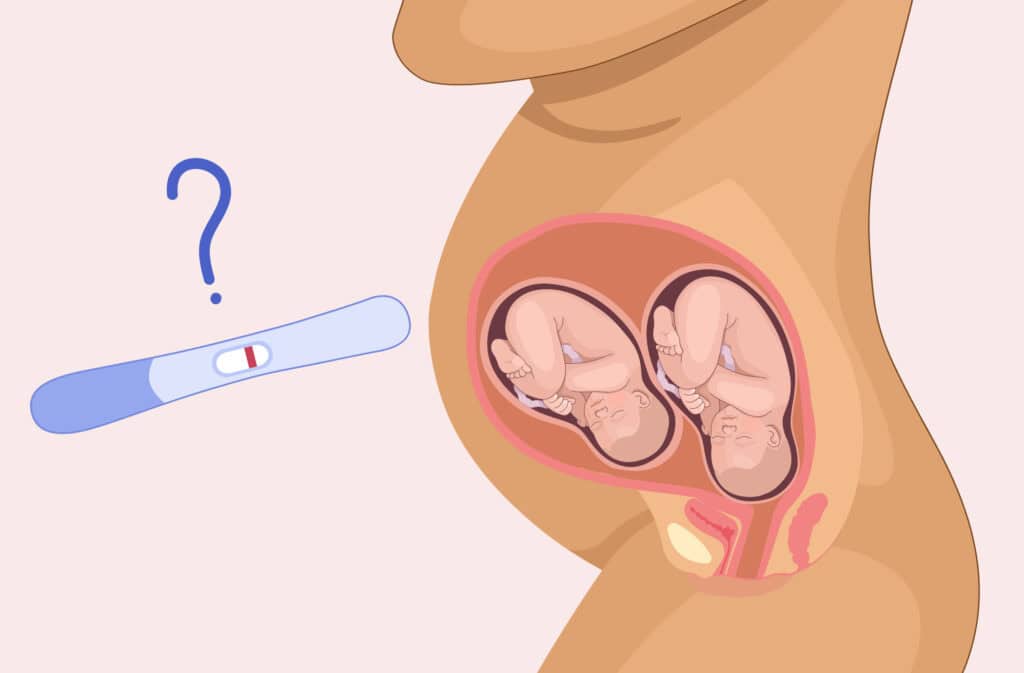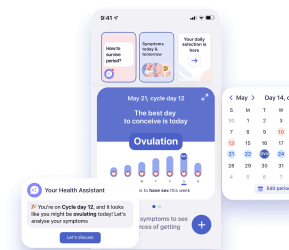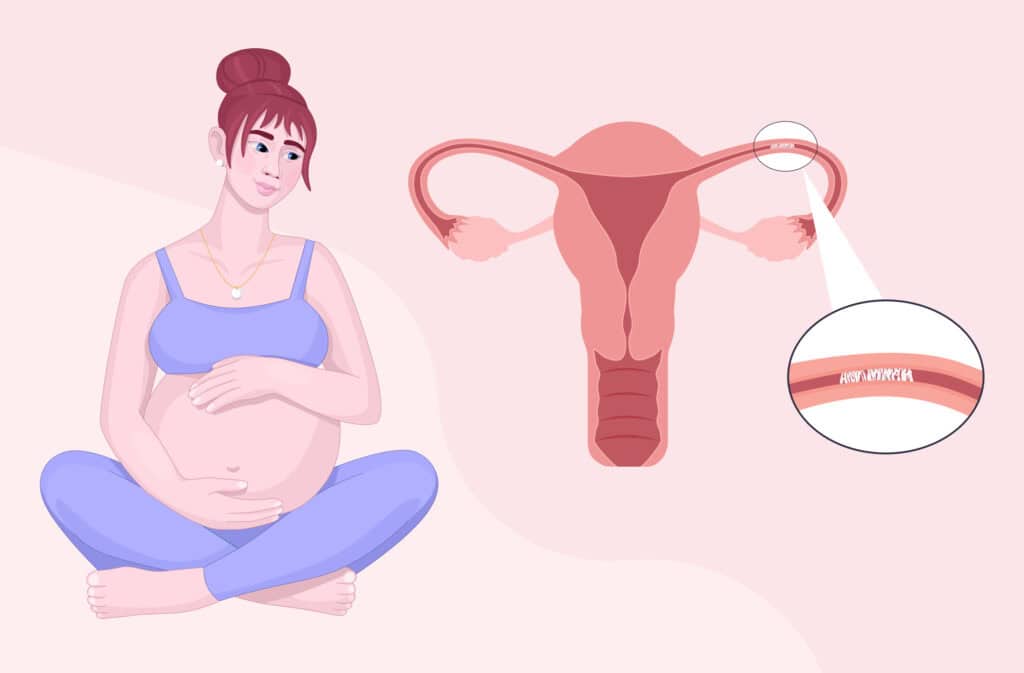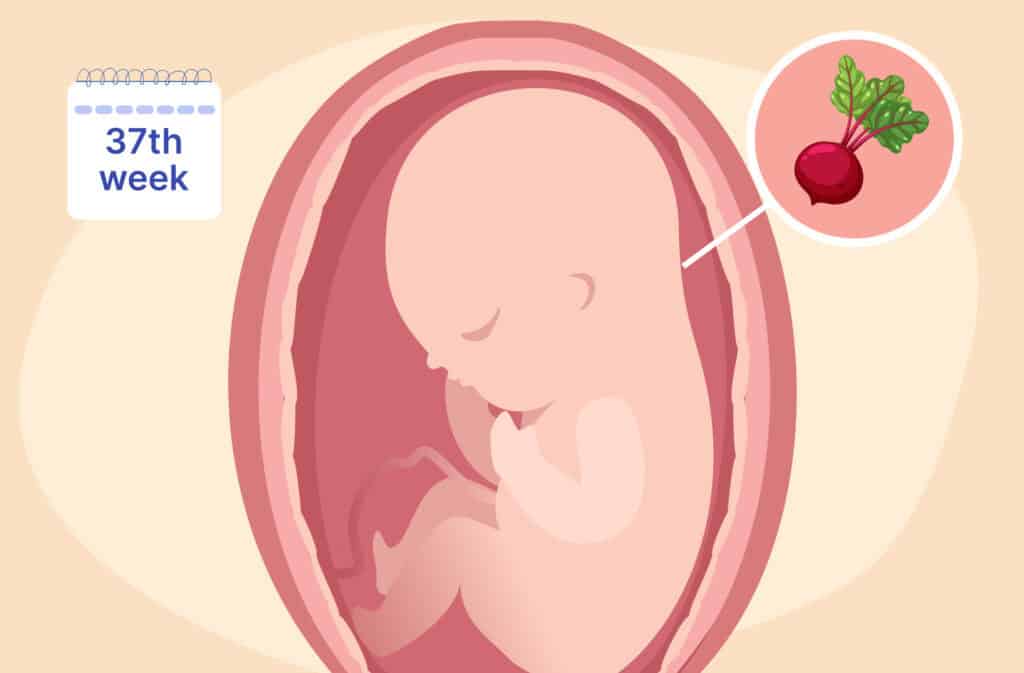Femia > Health Library > Getting Pregnant > Trying to conceive > Can twins cause false negative pregnancy test: Understanding HCG levels in twin pregnancies
Can twins cause false negative pregnancy test: Understanding HCG levels in twin pregnancies

- Updated Feb 28, 2025
- Published
CRAFTED BY HUMAN
Crafted by human At Femia, we provide accurate and up-to-date information at every stage of your journey, from trying to conceive, pregnancy and postnatal support. All content is created by a real person based on in-depth research and own professional experience. Femia ensures that you will receive expert advice, strict accuracy and a personalized approach from our authors/medical experts. Learn more about our editorial policy.
FACT CHECKED
Fact checked At Femia Health, we maintain the highest standards of editorial excellence in delivering content focused on helping you conceive, guiding you through pregnancy, and supporting you postpartum. Explore our content review principles to learn how we ensure the accuracy and quality of our health and lifestyle tips for every stage of your journey.
A pregnancy test with twins is rarely negative. So, seeing a negative pregnancy test, especially when you have signs indicating you might be pregnant, can be misleading. A twin pregnancy negative test can result from taking the test too early, a faulty pregnancy kit, or using dilute urine for the test. Consulting with your doctor can help you confirm whether you are pregnant and guide the personalized care you need for your twin pregnancy.
Home pregnancy tests are usually taken soon after you have missed your period. This is the waiting time for a fertilized egg to implant into your uterus, a short week after fertilization, during which the human chorionic gonadotropin hormone (hCG) starts being produced. A pregnancy testing kit detects this essential pregnancy hormone in your urine. With twin pregnancies, hCG levels are higher, often making a twins pregnancy test positive earlier in pregnancy. However, in certain cases, a twin pregnancy can show up as a negative test. We will look through some of these scenarios and explorethe optimal time to take a pregnancy test with a twin pregnancy.

How pregnancy tests work: Detecting hCG
To understand why you might receive a negative pregnancy test even when you feel you might be pregnant, it is important to know how pregnancy tests work.
A negative pregnancy test results from the absence of hCG hormone, a hormone specific to pregnancy, in your blood or urine. The placenta is the primary source of the pregnancy hormone hCG, the hormone detected by pregnancy tests. The placenta starts forming when your fertilized egg reaches and implants into your uterus.
👉Find out more: How soon after unprotected sex can I test for pregnancy?
Using a home pregnancy kit
A home pregnancy kit detects hCG in urine. Concentrated urine, most often urine you pass in the morning, is recommended for use in a home pregnancy test. Different pregnancy kits show positive results differently, either with two lines or a ‘+’ sign. In some cases, an early twins pregnancy test may result in lighter positive lines, for which you should repeat your test.
Medical blood test
Similarly, a blood test at your doctor’s office detects the hCG hormone in your blood. These results are usually available in a day or two. Blood tests are more accurate, as they can detect even the smallest spike in hCG hormones, as well as identifying the significant elevations noticed with twin pregnancies.
hCG levels in twin pregnancies vs. single pregnancies
Twin pregnancies are an outcome of two separate fertilized eggs. One phenomenon resulting in a twin pregnancy is when one egg splits into two and then both implant into the uterus. These pregnancies often result in twins of the same sex. Another type of twin pregnancy is when your body releases two eggs during ovulation, and both are fertilized with different sperm. These are called fraternal twins, and they can be of the same or different sex.
Considering twin pregnancies result in two fertilized eggs implanting into the uterus, and therefore two placentas are formed, twice the amount of hCG should also be released when compared to a single pregnancy.
A small 2018 study showed a median hCG level of 329 mIU/L at 13 days for single fetuses vs. 544 mIU/L hCG level with twins. These pregnancies were achieved through assisted reproductive techniques. While the difference is not significant, higher early spikes of hCG mean twin pregnancies are usually detected earlier than singleton pregnancies.
Can hCG levels vary in twin pregnancies?
Another study with 173 participants, who also conceived through assisted reproductive techniques, showed median hCG levels to be 389 at 14 days for twin pregnancies.
This lower level of hCG suggests that hormone levels can fluctuate and even vary from one twin pregnancy to the next. Early low levels can rise in the subsequent weeks as pregnancy progresses.
Taking your pregnancy test before you miss your period, when hCG levels are too low for standard testing kits to detect, is the most common reason to see a false twin pregnancy negative test. Another scenario in which your hormone level could be too low for detection is using diluted urine for the test. In most of these cases, taking another test in a week will result in a positive, once the hCG levels have risen sufficiently.
Can twin pregnancies cause a false negative pregnancy test?
Home pregnancy tests are close to 99% accurate when used as directed. This includes using the testing strip after a missed period and following all the guidelines given in the package insert of your pregnancy kit.
If you are pregnant, and the testing strip shows a negative, repeating the test within a week often shows a positive result. This is because of an increase in hCG levels, making your pregnancy detectable by the testing kit.
However, in some circumstances, repeated tests might still show a negative result even if you are pregnant. While rare, it is possible. This can leave you frustrated; however, there is often a simple explanation for these repeated false negative results.
Reasons for a false negative twins pregnancy test could include a faulty or expired pregnancy kit, testing too early before your missed period, or testing early and using dilute urine for the test. Taking your test first thing in the morning, a few days after a missed period can reduce the chances of a twin pregnancy negative test.
A more accurate way to confirm the diagnosis is through measuring hCG levels in a blood test.
👉Find out more: Can an ovulation test detect pregnancy: Here’s what you may want to know
@femia.fertility It happens more often than you might think! Pregnancy symptoms can be very similar to PMS symptoms and you might get a negative test result. Here are 4 reasons why that could be happening! #ttc #earlypregnancysign #pregnancysign #twoweekwait #ttcjourney #ttccommunity #upt #pregnancytest #hcg ♬ original sound - Femia fertility app
Can twins cause a false negative blood pregnancy tests?
A urine pregnancy test requires your hCG levels to be between a 20–50 mIU/L threshold level for detection. A negative test while pregnant with multiples indicates that your hCG level has not met this threshold, making the test appear negative.
Testing for the hCG hormone in your blood is unlikely to show up as a false negative. A blood test quantitatively measures the amount of pregnancy hormone present. Your doctor will recommend taking a blood test after a missed period, and a few weeks into the pregnancy to reduce chances of a false negative.
In extremely rare cases, both blood and urine twins pregnancy tests can appear negative. Termed the “hook effect,” having significant elevations in hCG hormone, as noticed with a pregnancy of multiples, can show up as a false negative pregnancy test. This is because slight variations in the type of hCG hormone, as well as a sample containing too much hormone, can affect its detection by the antibodies present in the lab testing kits.
When checking in with your doctor, be sure to mention all the pregnancy symptoms you are experiencing and also the repeated negative test results. Request a blood test, especially if you have had multiple negative urine tests. Your doctor might also recommend an ultrasound examination to help provide you with a confirmation of a twin pregnancy.
Negative pregnancy test twins: Common causes for error
Miscalculating your gestational age—which means checking for pregnancy earlier than when your next period is due—is a common reason for seeing a false negative pregnancy test. Additionally, since hCG levels rise slowly in the first week or so, early pregnancy tests can often be negative, turning positive within a week or so after a missed period.
Ectopic pregnancies, early pregnancy miscarriage, or a blighted ovum (fertilized egg which doesn’t develop) can also result in declining levels of hCG after an initial spike, resulting in a false negative pregnancy test.
A faulty pregnancy kit also causes a false negative twins pregnancy test. If repeated tests show a negative, but you feel that you might be pregnant, using a pregnancy test from a different brand or testing packet might give you the positive result you are expecting.
What should you do after a repeated twin pregnancy negative test?
If you experience early pregnancy symptoms, like breast soreness, heightened nausea, and incessant vomiting, coupled with a few weeks of being overdue on your periods, it is advisable to check in with your doctor. Twin pregnancies often cause an increase in pregnancy symptoms, but may not show up positive on a pregnancy test if hormones fluctuate or the testing kits are defective.
In some cases, having these symptoms along with a negative pregnancy test can also indicate other, more serious health concerns such as ectopic pregnancy, a miscarriage, or even cancer. To rule these out and receive personalized healthcare, check in with your physician, especially if you have a false negative pregnancy test.
When to test: Timing to detect twin pregnancies
Based on results from a community-based cohort study, home pregnancy tests have an approximate 90% sensitivity in detecting pregnancy on the first day after a missed period. This increased to 97% by the end of the first week.
For you, taking your pregnancy test at home soon after you have missed your period is very likely to come back positive. And, if you are pregnant with twins, the chance of a negative test is rare even in early pregnancy, since hCG is higher in a pregnancy of multiples.
To ensure you get a positive test, it is crucial to wait until you miss your period, as your chances of a false negative are higher when you take the test too early. Following all the instructions given in the package insert of your kit will help with receiving accurate results. Check the expiry dates on your pregnancy kits, as well.
👉Find out more: Evaporation line vs. faint positive: How to tell the difference on your pregnancy test
When to see a doctor for a false negative twins pregnancy test?
With multiple negative tests, yet the lingering feeling of being pregnant (not to mention the troublesome early pregnancy symptoms), you may want to check in with your healthcare provider. Describe what you have been experiencing so far in terms of possible pregnancy symptoms, and request tests to help confirm your pregnancy.
Confirming your pregnancy early can help you start on your prenatal care, ensuring a safe and healthy pregnancy for you and your twins.

Questions from the Femia community
Can a faint line on a pregnancy test indicate I am having twins?
A faint line on a pregnancy test doesn’t necessarily indicate you have twins. Pregnancy tests only detect your hCG hormone levels. Having low levels of the hormone in your urine could be a reason for the faint line. Even faulty kits can give faint lines. However, a faint line is no indication of whether you are having multiples or a single. An ultrasound is the only way to confirm a twin pregnancy.
Can symptoms of a twin pregnancy appear before a positive pregnancy test?
A twin pregnancy can cause a higher elevation of your hCG pregnancy hormones. This means you can have more noticeable early pregnancy symptoms even before you miss your period. These symptoms could include nausea, vomiting, fatigue, or breast tenderness. Check in with your doctor if the symptoms are severe and unmanageable at home.
I suffer from a hormonal condition. Can it cause a false negative in a twin pregnancy?
The hCG hormone detected by pregnancy tests is only produced after you become pregnant. So, even if you have a hormonal condition and become pregnant, it is unlikely to affect the results of the pregnancy test you take. Rarely, hormonal fluctuations, which can hamper hCG levels, might result in a false negative test. However, repeating the test in a few days should provide a confirmatory result.
The bottom line
Being pregnant with twins is often detected earlier with a home pregnancy test compared to a singleton pregnancy. This is because the hCG hormone produced is higher when two eggs implant into the uterus. However, with slow variations in pregnancy hormone surges, taking the test too early or using a faulty testing kit can result in a twin pregnancy negative test.
If you feel you are pregnant and experiencetell-tale pregnancy signs coupled with a missed period, check in with your healthcare provider. You may need a blood test and ultrasound to confirm your pregnancy and let you know you are having twins. Early detection of twins can ensure you receive the personalized care you require for your pregnancy.
References
- Póvoa, Ana, et al. “First Trimester β-hCG and Estradiol Levels in Singleton and Twin Pregnancies After Assisted Reproduction.” Journal of Perinatal Medicine, vol. 46, no. 8, July 2017, pp. 853–56, https://doi.org/10.1515/jpm-2017-0132.
- Khadra, Maysa M., et al. “Human Chorionic Gonadotropin Cutoff Value Determined by Receiver Operating Characteristic Curve Analysis Is Useful but Not Absolute for Determining Pregnancy Outcomes.” Middle East Fertility Society Journal, vol. 21, no. 2, Dec. 2015, pp. 120–24, https://doi.org/10.1016/j.mefs.2015.11.003.
- Boxer, Jackie, et al. “Home Pregnancy Tests in the Hands of the Intended User.” Journal of Immunoassay and Immunochemistry, vol. 40, no. 6, Sept. 2019, pp. 642–52, https://doi.org/10.1080/15321819.2019.1671861.
- Reitz, Joshua, et al. “A Case of a Negative Urine Pregnancy Test in a Multiple Gestation Pregnancy.” Cureus, Oct. 2022, https://doi.org/10.7759/cureus.30725.
- Muleba, Ndaya, et al. “Human Chorionic Gonadotropin Levels Following Spontaneous Abortion in the First Trimester.” American Journal of Obstetrics and Gynecology, vol. 193, no. 6, Dec. 2005, p. S116, https://doi.org/10.1016/j.ajog.2005.10.409.
- Wilcox, Allen J. “Natural Limits of Pregnancy Testing in Relation to the Expected Menstrual Period.” JAMA, vol. 286, no. 14, Oct. 2001, p. 1759, https://doi.org/10.1001/jama.286.14.1759.

Discover how to get pregnant with blocked fallopian tubes in 7 steps. Learn about symptoms, treatments, and success stories. 30% of women face this – find hope and solutions here!

Discover the best age to get pregnant with PCOS and how to get pregnant with PCOS. Read expert tips on managing PCOS, and improving fertility naturally and with treatments.

At 37 weeks pregnant, you are still early term. Learn about labor signs, baby development, and tips for managing discomfort.

